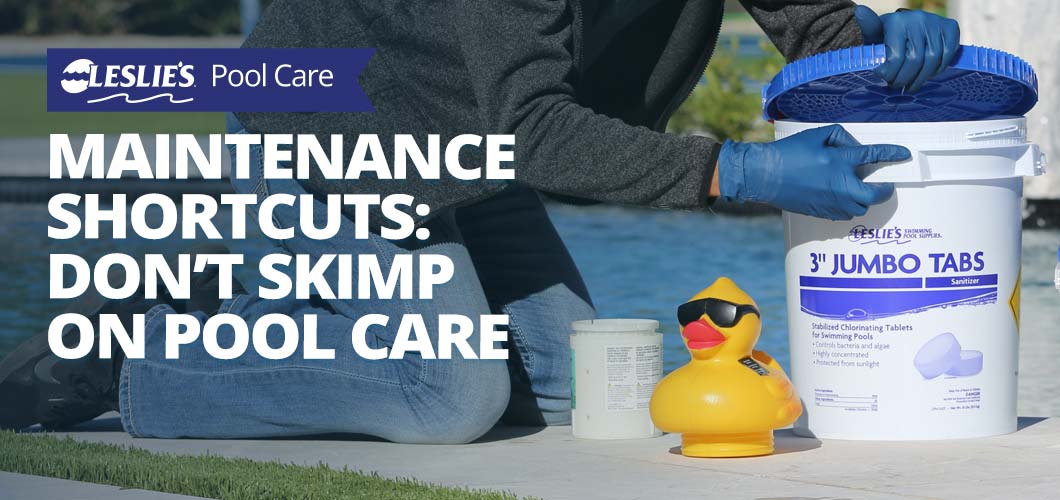
Pool Maintenance Shortcuts: Don't Skimp on Pool Care
Life gets busy — we get it. Between work meetings, school events, extracurricular activities, hobbies, family time, and maintaining some semblance of a social life, there are only so many hours in a day! And now, more than ever, savvy shoppers are looking for ways to cut costs and minimize expenses. Some tasks and responsibilities have quick and easy shortcuts that help save time and money, or they can be delayed without consequence. But if there’s anything you can’t afford to take a shortcut on, it’s caring for your pool. Skimping on pool maintenance or leaving pool care tasks untended can cause all sorts of problems, including:

Algae growth taking over your pool

Unsanitary water causing illness in swimmers

Corrosive damage to your pool and equipment
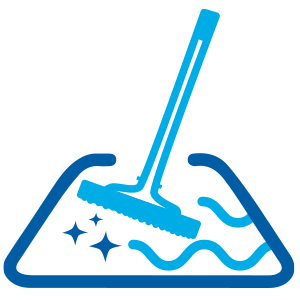
Stains and scale accumulating on pool surfaces
REMEMBER: It’s far easier (and less expensive) to keep up with routine pool care than it is to correct major problems caused by a lack of pool care.
Water Balance
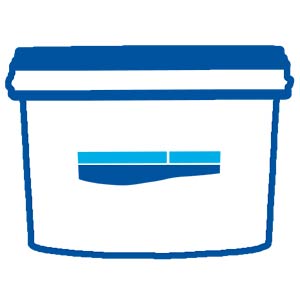
How do major pool issues happen? Nine times out of ten, pool and equipment damage or water quality issues are a direct result of letting basic pool care tasks — like weekly testing and water balancing — lapse. Keeping up with pool water care may seem like a mundane hassle. However, making minor adjustments on a weekly basis is much easier than having to play catch-up with major chemistry changes. It can also save you lots of money in the long run.
Neglecting water balance can lead to pool damage and costly repairs. Poor water balance will also shorten the lifespan of your pool equipment. Imbalanced water chemistry will corrode metal hardware and pool equipment, etch and pit plaster pool surfaces, make vinyl liners become brittle, cause eye and skin irritation, and lead to poor water visibility, among other issues. To learn more about different problems caused by water imbalance, check out our popular Resource Center article, Pool Chemistry 101.
Most pool owners only need to test and rebalance their water once a week. However, periods of hot temperatures, increased pool usage, and sudden changes in weather can all cause rapid changes in water chemistry. In these cases, it’s important to test and adjust water chemistry more frequently to keep it balanced within ideal ranges.
DID YOU KNOW? The warmer the water temperature, the faster chemical reactions happen in your pool. Warmer water also encourages algae growth. This is why it’s so important to run the pool pump longer and test the water more often when air temperatures are above 90ºF. Doing so will help keep the water balanced, sanitized, and algae free.
Water Testing
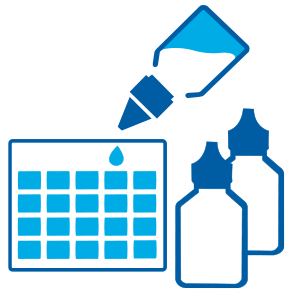
Where most pool owners get into trouble is when they skimp on weekly water testing. Sometimes, they forgo weekly water tests and make chemical dosing assumptions based on past water testing trends. Other times, they only test the water every couple of weeks and make major adjustments all at once. The problem with these approaches is that they both leave your pool and equipment vulnerable to damage from major imbalances. Adding chemicals to the water without knowing the current chemistry levels is like trying to land a plane blindfolded — your odds of success are very low. Waiting longer than a week to balance the chemicals is even worse — this gives your pool more opportunity to slide even further down the scale of imbalance and cause more damage to the pool.
No matter the scenario, it’s much faster and more cost-effective to make small, precisely measured adjustments to water chemistry according to your weekly water test results. If you try to make major adjustments based on assumptions or overdue water tests, it’s very easy to accidentally overdose the pool. Not only does this cause a yo-yo effect in chemistry levels, but you’ll also miss out on valuable swim time while you make extra adjustments and wait for the water to return to ideal testing ranges.
Sanitization

Speaking of testing the water, it’s important to keep an eye on sanitizer levels during your weekly tests. Most pool owners actually check their sanitizer levels at least two or three times per week, minimum. Testing Free Available Chlorine levels often ensures the pool stays safe and healthy for swimmers.
Maintaining a sufficient sanitizer level is a vital part of sustaining a healthy swimming environment. If there’s not enough sanitizer in the water, it can lead to algae problems or the spread of infectious microorganisms. Unsanitized water may cause diarrhea, skin rashes, ear pain, cough or congestion, eye pain, or other severe illness requiring hospitalization.
Chlorine and other disinfectants are effective at killing germs found in recreational water, but they do not work instantly. Therefore, it is crucial to maintain the proper Free Available Chlorine level of 1–4 parts per million (ppm).
DID YOU KNOW? Water balance plays an important role in the germ-killing power of your sanitizer. For example, a high pH reduces chlorine efficacy, and a low pH can cause chlorine to dissipate faster than normal. Keeping pH balanced between 7.4–7.6 will not only prevent damage in your pool, it will also maximize the sanitization power of your chlorine.
Cleanliness

Regular cleaning and maintenance doesn’t just improve the aesthetic of the pool. It also keeps the pool functioning properly and helps maintain the value of your home by avoiding major problems. Cleaning the pool thoroughly — and often — prevents unsightly stains and scale buildup. In addition, it can even help you save money on chlorine and other pool chemicals. Skimming out large debris, brushing all pool surfaces, and vacuuming settled debris from the pool floor is an important part of weekly pool care, even if you use an automatic pool cleaner to take care of the heavy lifting.
Remember to also clean out the pool filter, pump strainer, and skimmer baskets as needed. This ensures proper water circulation, which is important for filtration and distributing sanitizer and other treatment chemicals throughout the pool.
Leslie’s Can Help
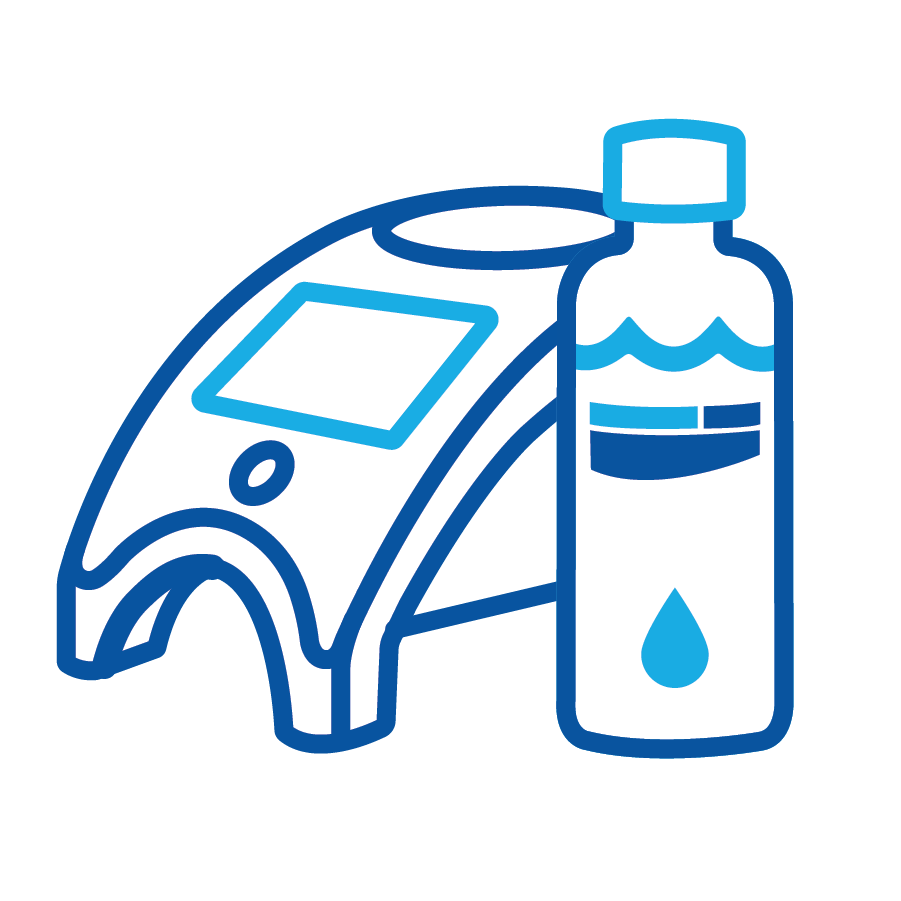
Maintaining proper water balance and sanitization is crucial for keeping your swimming pool clean, safe, and beautiful. Taking shortcuts or neglecting pool maintenance can lead to a variety of problems, including the spread of germs and bacteria, costly pool repairs, and shortened lifespan of your pool equipment.
If you’re looking for the ULTIMATE pool care shortcut, just bring a water sample to your local Leslie’s. We offer free in-store AccuBlue® water testing at all of our more than 1,000 store locations nationwide. Not only is this water test completely free, but we’ll also give you a 10-point water analysis, a water quality score, and a customized step-by-step treatment plan based on your test results. AccuBlue offers the highest level of water testing precision available, and the product dosage recommendations eliminate the guesswork from your water balancing routine. You can’t get that from your average at-home water test kit!